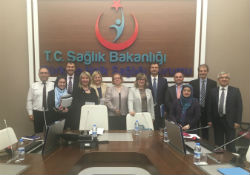Turkey: strengthening primary health care for better noncommunicable disease outcomes

WHO
An interdisciplinary team visited Turkey from 18 to 22 April 2016 to follow up on the country's progress in scaling up core noncommunicable disease (NCD) services in primary health care. The focus was on strengthening the model of care, addressing human resource issues, introducing performance management and reviewing incentives. In addition, meetings also touched upon the sustainability of Turkey's impressive gains in health outcomes and financial protection.
The team comprised Dr Melitta Jakab (Senior Health Economist, WHO), Professor Jose Valderas Martinez (Health Services and Policy Research Group, Exeter University, United Kingdom) and Mr Alexandre Lourenco (WHO Consultant, Portugal). The meetings were facilitated by Dr Pavel Ursu (WHO Representative, Turkey) and Dr Toker Ergüder (Technical Officer, WHO Country Office, Turkey).
Recommendations to strengthen primary care
The team identified a number of health system opportunities that could accelerate early detection of cardiovascular disease, diabetes and cancer; strengthen disease management; and ensure timely referral. 6 recommendations were made to strengthen primary care to cope with the increasing burden of chronic conditions.
- Implement the new vision for integrated primary care.
- Introduce cascading performance management with a focus on NCDs.
- Strengthen the evidence base.
- Continue to invest wisely in human resources.
- Reflect on resource allocation patterns and sustainability.
- Rethink incentives.
With an ageing population and possible economic slow-down, the number of people experiencing chronic illness will continue to rise, and many will have multiple chronic conditions simultaneously.
Turkey – one of the first among 12 countries to carry out the health system assessment for NCDs –committed to strengthening primary health care to detect and manage NCDs more effectively. It is now widely recognized in Turkey that the next generation health challenge is to tackle NCDs. The vision and strategies put forward are fully in line with WHO recommendations and Health 2020, and the key challenge is to effectively implement them.
Based on the assessment and discussions with key stakeholders, policy recommendations were grouped around 5 main themes.
- Strengthen coordination and governance mechanisms.
- Accelerate action on obesity and nutrition risk factors for NCDs.
- Increase the role of family medicine in NCDs.
- Mainstream equity and social determinants of health into action and reporting.
- Analyse to build the case for change and refine NCD plans.
"Like many countries, Turkey is facing a growing NCD disease burden. The country has already made impressive progress to implement many recommended core population interventions for NCDs. In terms of core individual services, Turkey has made great strides to improve access to quality health care services at all levels, with well documented impact on maternal and child health outcomes," said Dr Ursu. "Nevertheless, challenges remain in terms of integrating timely detection and continuous management of cardiovascular disease conditions, diabetes and cancer into family medicine," he emphasized.



